©Copyright 2002-2008
[Shawn Nacol]
All rights reserved |
 

 | 
We are what we repeatedly do. Excellence, then, is not an act, but a habit. - Aristotle I'm an obsessive reader (and recommender) of books. If you're a playwright or are curious about writing for the stage, you might want to check out some of these books. All of them are well worth the time and money you'll invest. I list them here in purely idiosyncratic order.  THE BOOK EVERY YOUNG PLAYWRIGHT MUST OWN THE BOOK EVERY YOUNG PLAYWRIGHT MUST OWN
 Dramatists Sourcebook. The Bible, the Qu'ran, the Kama Sutra and the Eagle Scout Handbook rolled into one. TCG publishes this biennially now (more's the pity), but it has so much info between its covers it boggles the mind. Dramatists Sourcebook. The Bible, the Qu'ran, the Kama Sutra and the Eagle Scout Handbook rolled into one. TCG publishes this biennially now (more's the pity), but it has so much info between its covers it boggles the mind.
"Called "the essential guide to professional opportunities and playscript procedures" by The Dramatists Guild of America, the Dramatists Sourcebook contains more than nine hundred opportunities for playwrights, translators, composers, lyricists, and librettists, including script-submission procedures for hundreds of professional theaters, more than one hundred prizes, and scores of publishers, fellowships, residencies, developmental programs, agents, service organizations, state arts agencies, and reference publications. This fully revised twenty-fifth edition is thoroughly indexed and contains an invaluable calendar of submission guidelines, as well as the "Simple Working Guide for Playwrights" by Tony Kushner." Buy it. Read it. Dogear it. Revisit it. Love it. Live it. Sleep with it under your pillow. 
| 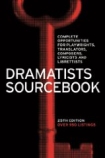
|
The way I see it, everyone in theatre should have already read their Euripides, Shakespeare, Moliere, Wilde, Williams, O'Neill, Beckett, Pinter, etc. I'm not going to do a list of "plays everyone should read" because frankly, you should have read them... but here are some plays vaguely off the beaten path that I return to again and again; all are well worth buying and falling in love with, deeply and irrevocably.  Plays to read... Scripts you should own... Plays to read... Scripts you should own...
 The Swan by Elizabeth Egloff The Swan by Elizabeth Egloff
Wow. Simply one of the greatest plays I saw onstage in the US in the 1990s. Underappreciated and more-than-deserving of a close examination for its language and savage images. About a swan who crashes into a picture window and the woman who adopts him to the dismay of her married lover. Breathtaking, literally. 
| 
|  The Lion in Winter by James Goldman The Lion in Winter by James Goldman
"What family doesn't have it's little ups and downs?" Brilliant characterizations, scorching dialogue and a plot drawn from a footnote in Plantagenet history? DOES IT GET ANY BETTER?!?!? It is Christmas of 1183, and Henry II of England has released his wife, Eleanor of Aquitaine, from prison for the holidays at Chinon. For all their regal status, they are much like any long-estranged but inseparably married couple: Henry flaunts his new mistress; Eleanor plots against him with their sons. They will do anything they can to hurt each other. and they love each other to distraction. Ferocious and sidesplitting. 
| 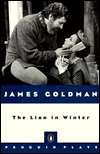
|  The Visit by Friedrich Duerrenmatt The Visit by Friedrich Duerrenmatt
Yowza. Holy expressionistic tragicomedy, Batman! A cruel, dark play that manages to be satirical and romantic and tragic and funny and horrible at the same time. It tells the story of the richest woman in the world returning to the filthy little town where she was born to exact a horrifying revenge on the man she first loved, who betrayed her for convenience. Out of these elements, Duerrenmatt has fashioned a many-leveled play which is at once a macabre parable, a deeply moving tragedy, and a scathing indictment of the power of greed. 
| 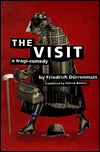
|  The Mystery of Irma Vep and Other Plays by Charles Ludlam The Mystery of Irma Vep and Other Plays by Charles Ludlam
A man that has been forgotten by a community that should know better, Ludlam was one of the great wits of the theatre for the better part of 3 decades and his contributions were colossal and his legacy ubiquitous. Not many playwrights can lay claim to running their own theatre for almost 25 years (in its day, the Ridiculous was only comic repertory in America) and a body of work recognized commercially and critically in its own time. Even the plays that aren't brilliant in themselves contain brilliant ideas or elements or moments. If nothing else, read him for the ferocity of his dramaturgical appetite and his willingness to experiment. Times: "America's most original comic genius of the stage. Both as an actor and playwright, his work was hailed for its originality and farcical wit the world over." If you can find a copy of the full, 905 page, out-of-print Complete Plays of Charles Ludlam, it's well worth tracking down. It includes less "slick" scripts as well as his more famous titles. And if you're interested in more about his amazing life: I heartily recommend: Ridiculous! : The Theatrical Life and Times of Charles Ludlam and Ridiculous Theatre: Scourge of Human Folly: The Essays and Opinions of Charles Ludlam 
| 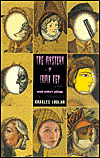
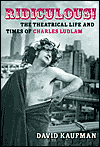
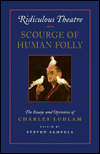 |  Noises Off by Michael Frayn Noises Off by Michael Frayn
A brilliant deconstruction of farce and a brilliant farce in its own right. The classic farce by the Tony Award-winning author of Copenhagen, is not one play but two: simultaneously a traditional sex farce, Nothing On, and the back-stage "drama" that develops during Nothing On's final rehearsal and tour. The two begin to interlock as the characters make their exits from Nothing On only to find themselves making entrances into the even worse nightmare that's happening backstage. This play is perfect proof that not every play can make it to the stage through readings and workshops, and if you don't believe me, imagine seeing Act 2 read by seated actors at music stands. 
| 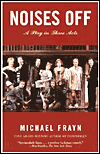
|  Les Liaisons Dangereuses by Christopher Hampton Les Liaisons Dangereuses by Christopher Hampton
From the scandalous novel by Choderlos de Laclos about the conspiracy between two infamous libertines to corrupt a young girl barely out of her convent. Stylishly plumbs the complex moral ambiguities of seduction and revenge. A dazzling adaptation of one of the great epistolary classics of the 18th century (if not all time). Hampton's work illuminates much and misses little. A perfect example of cold, elegant comedy of sexual manners that somehow managed to become an overwhelming commercial success; proof that bourgie audiences aren't made up of morons. 
| 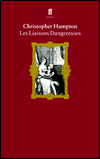
|  Raised in Captivity by Nicky Silver Raised in Captivity by Nicky Silver
My favorite of Nicky's plays and the one that anchored his reputation as a writer to watch in the early 90s. The kind of brutal family farce/tragedy for which Nicky is infamous. The story of a brother and sister traumatized by their mother's death and the bizarre people with which they've populated their respective worlds. Following the funeral of his mother, Sebastian finds himself thrust into situations against his will. His twin sister Bernadette is completely unstable, her husband Kip is a dentist who hates teeth, his psychiatrist Hillary is a self-mutilating basket case, and his only friend is Dylan, a convicted murderer whom he writes letters to and has never seen. While you're at it, you might as well pick up a copy of his meaty collection: Etiquette & Vitriol: The Food Chain and Other Plays. 
| 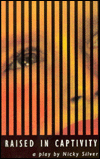
|  How I Learned to Drive by Paula Vogel How I Learned to Drive by Paula Vogel
A girl remembers her sexual awakening under the tutelage of her abusive-yet-loving uncle. The 1950s pop music accompanying Li'l Bit's excursion down memory lane cannot drown out the ghosts of her past. Sweet recollections of driving with her beloved uncle intermingle with lessons about the darker sides of life. Li'l Bit navigates a narrow path between the demands of family and her own sense of right and wrong. This is Vogel's best play and winner of the Pulitzer Prize in 1998. Terrific nonlinear structure and some hilarious use of theatrical conventions. Hilarious and touching and unsettling. 
| 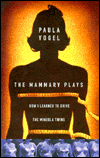
|  M. Butterfly by David Hwang M. Butterfly by David Hwang
Based on a true story, a stylized drama about a French diplomat has a 20-year affair with a young actress only to discover that she is in fact a man and a Communist spy working against the French government. A Tony Winner for best play this is Hwang's best and beat-known work. A thrilling examination of culture, politics, and gender. Inherently thought-provoking and elegant, it's a thrilling piece of theatre that managed to sneak past the quality police at the end of the 1980s, no mean feat). 
| 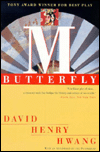
|  Equus & Lettice & Lovage by Peter Shaffer Equus & Lettice & Lovage by Peter Shaffer
A modern classic. Equus examines the passionate motivations of a young man who has blinded 6 horses with a spike... as well as the dangers and the necessity of the human capacity for worship. Lettice & Lovage tells the story of a very unusual friendship between a pair of eccentric Englishwomen who share a passionate love of history, art & beauty and a distaste for the oppressive dreariness of modern urban life. The bond they forge provides both comedy and commentary as they take up arms against dullness and conformity. Never a playwright to shy away from technically demanding, visually arresting theatre in three robust dimensions, Peter Shaffer is the undisputed master of antithetical duologue: Apollonian ideals vs. Dionysian disruption. Read Lettice & Lovage for it's quirky hilarity and Equus for it's intellectual spectacle and visual poetry. 
| 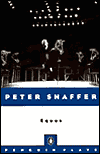
|  Cyrano de Bergerac by Edmond Rostand (translated by Anthony Burgess) Cyrano de Bergerac by Edmond Rostand (translated by Anthony Burgess)
One of the greatest plays ever written, with a plot so brilliant that people steal from it constantly. Romantic and swashbuckling and hilarious, Edmond Rostand's bittersweet melodrama tells the tale of France's master swordsman: Cyrano de Bergerac, a magnificent hero cursed with the face of a clown. Equipped with a massive nose and a heart to match, Cyrano must lend his words of love to another man to woo the woman he yearns for. She falls in love with Cyrano’s words, unaware that they are borrowed. Exciting and romantic and funny and quite possibly the perfect tearjerker. If you don’t believe me, try watching it without weeping. Although Jose Ferrer won Best Actor for his 1950 portrayal, the 1990 Gerard Depardieu version is hands-down the version to watch. 
| 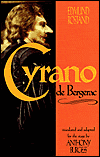
|  My Sister in this House. by Wendy Kesselman My Sister in this House. by Wendy Kesselman
Dark, sexy and disturbing. A deeply claustrophobic drama set in Le Mans, France in the early 1930s. This award-winning drama is based on a celebrated historical murder case in which two maids, incestuous sisters, were convicted of murdering their employer and her daughter. Definitely watch Kesselman's stunning adaptation of the play for film, entitled Sister My Sister. 
| 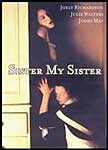
|  Caligula by Albert Camus Caligula by Albert Camus
A view of the infamous Roman emperor's descent into debauchery that tries to find the logic behind his legendary madness. Crazy and spectacular and rarely-seen outside of hideous college productions. The degradation of Rome dramatized in an intellectually challenging bio-saga. Much more self-consciously "structured" than you might expect from Camus. Good old-fashioned well-made play-ness harnessed in service to some decidedly disturbing existential philosophy in a thoroughly dramatic manner. If you can find it, check out the new translation done by David Greig for the 2003 production at the Donmar Warehouse. 
| 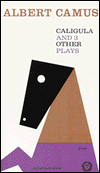
|  Holiday by Philip Barry Holiday by Philip Barry
A bittersweet, glossy 1930s comedy of the sort they don't concoct anymore. A young man falls in love with a beautiful socialite and finds out that marrying into money is a helluva thing to ask of a guy. The whole play is tinged with a kind of world-weary style that is as witty as it is affecting. The Katherine Hepburn/Cary Grant film is an annual must-watch. 
| 
|  Deathtrap & Veronica's Room by Ira Levin Deathtrap & Veronica's Room by Ira Levin
Two musts from the master of the contemporary thriller (most famous for The Stepford Wives and Rosemary's Baby) Deathtrap is a flawless comedy thriller about an author of comedy thrillers who finds himself caught up in one of his own plots, and quite possibly the victim of his own plotting. Vicious and diabolically clever. A masterpiece of suspenseful construction. Also check out the excellent film adaptation with Michael Caine & Christopher Reeve. Veronica's Room is a freaky woman-in-peril thriller about a young lady who innocently agrees to help an elderly couple and finds herself apparently marooned in another time, unable to convince people of her true identity. Claustrophobic and nerve-wracking. 
| 
|  You Can't Take It With You by George Kaufman & Moss Hart You Can't Take It With You by George Kaufman & Moss Hart
Pulitzer Prize Winner for 1931. The play centers around the crazy Sycamore family, focusing on the "normal" daughter, Alice. Alice is engaged to Tony Kirby, but feels the gap between his straight-laced roots and her outlandish upbringing will be to strong. In an effort to dissuade her, Tony surprises her by bringing his parents to visit on the wrong night so they get an accurate idea of Alice's family. I'm listing the 3 play collection of their most beloved scripts because they're all worth a read (as is Moss Hart's biography Act One listed below, which details the writing of Once in a Lifetime) 
| 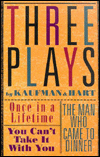
|  La Bete by David Hirson La Bete by David Hirson
In the 17th century, a pompous, incompetent boob is foisted upon a theatrical troupe by their royal patron with cataclysmic results... The play is a faux-Moliere that perfectly catches the malicious spirit of Richard Wilbur's rhyming translations. A manic meditation on art and principles. David once gave me one of the best pieces of professional advice I've ever received: "Listen to what people have to say, but at a certain point you have to tell them that you are the artist. It's your play." 
| 
|  Betty's Summer Vacation by Chrisopher Durang Betty's Summer Vacation by Chrisopher Durang
Absurd, caustic indictment of modern love, social mores, and contemporary media culture and the evolution of bourgeois values. For some bizarre reason, though this play was a HUGE hit in it's run at Playwrights Horizons, it never transferred into a commercial house for a run... more's the pity. Looking for a little rest and time by herself, Betty rents a summer share at the beach. But Betty's luck turns to delicious lunacy when this sensible Everywoman gets drawn into the chaotic world of some wildly unsavory housemates - her friend Trudy, who talks too much and says too little; the lewd, seminaked Buck, a sex addict; and Keith, a serial killer who hides in his room with a mysterious hatbox. With sand between her toes and a house that hides a weird secret, walking a thin line between sanity and survival, poor Betty will leave her summer vacation more terrorized than tan. 
| 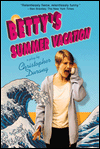
|  Scenes from the Big Picture. by Owen McCafferty Scenes from the Big Picture. by Owen McCafferty
World premiere - at the National Theatre, London - of an epic, twenty-character play by an up-and-coming Irish writer featuring my friend Michelle Fairleigh. When she invited me I had no idea what to expect and promptly had my head blown open. The play takes place over the course of a hot summer's day in an imagined area of present-day Belfast. We see a day in the life of over twenty inhabitants of the district as their stories interweave and collide. In a tour de force of dramatic writing, a whole world is evoked in a couple of hours. 
| 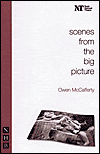
|  Rise and Fall of Little Voice by Jim Cartwright Rise and Fall of Little Voice by Jim Cartwright
A shy girl struggles with an overbearing mother and a hidden vocal talent that changes their home irrevocably. A strange, claustrophobic, wistful, mean-spirited comedy with ugly dramatic undertones that manages to be heartwarming without descending into sentiment. Written for the incomparable Jane Horrocks. Skip the consummately mediocre film version and go right to the source. 
| 
|  Earth and Sky by Douglas Post Earth and Sky by Douglas Post
A poetic thriller about a would-be poet and part-time librarian named Sara McKeon whose lover of ten weeks, David Ames, is found dead one hot August morning in the city of Chicago. A tender, elegiac, economically constructed noir about poetry, pain and a young couple who meet and seem to fall in love. The young man in question may or may not be a criminal, and his lady is determined to discover the truth. Fantastic, tight, cerebral thriller for the stage. "Douglas Posts' Earth and Sky is a case of film noir on stage. The devious U-turns in the plot continue past the evening of this taut new thriller" - NY Times 
| 
|  The Little Foxes by Lillian Hellman The Little Foxes by Lillian Hellman
Nasty, nasty, nasty, and wise. Hellman’s most famous, most performed play is an acidic, chilling drama about a Southern family destroyed by greed and overwhelming ambition. The titular foxes are a particularly ravenous turn-of-the-century Southern moneyed clan, the Hubbards who have clawed and scrabbled their way to the top of the heap in their small town, now hungry for new conquests. The play centers on Regina, the brilliant but ruthless sister who is more than willing to sacrifice her family to achieve the status and power she craves, and manages to destroy everyone around her. And the striking 1941 film is a compelling classic. 
| 
|  Accidental Death of an Anarchist by Dario Fo Accidental Death of an Anarchist by Dario Fo
A group of police try to explain how a prisoner managed to commit suicide through a locked window at police headquarters, leading to a chain of events in which the judicial and police corruption of 1970s Italy is thrown into relief A subversive drama based on a true-life story. Manages to balance blistering satire with brutal comedy. A wildly entertaining farce that manages to be ABOUT something deadly serious. Dario Fo won the Nobel Prize for Literature in 1997 and this is his funniest and most famous play. 
| 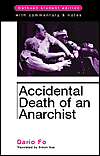
|  Saint Joan by George Bernard Shaw Saint Joan by George Bernard Shaw
A dazzling and eminently readable play about a remarkable moment in history. With Saint Joan, Shaw reached the height of his fame as a dramatist. In this magnificent drama he distilled many of the ideas he had been trying to express in earlier works on the subjects of politics, religion and creative evolution. Fascinated by the story of Joan of Arc, but unhappy with the way she had traditionally been depicted, Shaw wanted to remove 'the whitewash which disfigures her beyond recognition'. He presents a realistic Joan: proud, intolerant, naive, foolhardy, always brave -- a rebel who challenged the conventions and values of her day. 
| 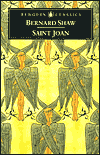
|
The following are excellent nonfiction titles that have helped push my writing out in new directions.  (Constructive) Criticism (Constructive) Criticism
 Tragedy and Comedy by Walter Kerr Tragedy and Comedy by Walter Kerr
Amazon: "Walter Kerr offers this exhaustive study into the nature of comedy for us to explore. He started out, by his own admission, trying to write a book about the nature of comedy only and not involving tragedy. As he went along, he realized that he could not do so for the very root of comedy is tragedy. Comedy is born through proper, high tragic elements and lets the viewer see the "behind the scenes" or the "truth" of an event. A tragic moment is a man stepping up to the microphone and letting you know that the president has been shot. The "truthful" or "comic" moment is the exact same scene, but you see the man stub his toe on the platform and whisper an expletive right when he gets into microphone range. It is a fantastic book and puts Walter Kerr up there with the top critics of modern times."

| 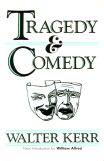
|  How NOT to Write a Play by Walter Kerr How NOT to Write a Play by Walter Kerr
Amazon: "This book was originally written in the mid-50s as an attack on the even-then stale conventions of realism and the well-made play. It remains an indispensable guide for the playwright who is searching to create their own style, especially if that style has nothing to do with sofas and kitchen sinks. Kerr, the renowned NY Times Theater critic, uses this book to beg, implore, and prod playwrights into accepting, exploring and exulting in all that is theatrical and dramatic. If your idea of great theater involves the unities of time and place, and a penchant for realistic sets, then please do yourself and theater lovers the courtesy of purchasing Screenplay by Syd Field. On the other hand, if you strive to create great theater, then How NOT to Write a Play is for you."

| 
|  Deathtraps: The PostModern Comedy Thriller by Marvin Carlson Deathtraps: The PostModern Comedy Thriller by Marvin Carlson
A solid examination of the comedy thriller genre from its roots to its most po-mo descendants. A detailed, thorough, enthusiastic rumination on why we enjoy comedy thrillers and what distinguishes the classics of the genre... While living in London, I picked up a hardcover copy of this for 2 quid in a bookstall and it turned out to be one of my favorite pieces of hands-on structural criticism. Very smart, not lit-crit-wanky at all. 
| 
|  The Dark Voyage and the Golden Mean: A Philosophy of Comedy by Albert Spaulding Cook The Dark Voyage and the Golden Mean: A Philosophy of Comedy by Albert Spaulding Cook
"In his sharply angled book of criticism, Professor Cook offers a new approach to comedy in literature... A philosophical exploration of comedy from the ideas of the probablye and the wonderful. Professor cook casts new light on the nature of both tragedy and comedy, their subjects, goals and techniques." 
| 
|  The Power of the Playwright's Vision: Blueprints for the Working Writer The Power of the Playwright's Vision: Blueprints for the Working Writer
by Gordon Farrell
A slender little book that actually adds a new perspective to the mix. Lots of intriguing ideas in this one. Amazon:"In a clear and easily understood way, Gordon Farrell makes available the most potent and effective structures ever devised by the world's most important dramatists. As a university theatre instructor, I feel that Gordon Farrell's book is highly valuable not only students of playwrighting, but also to students who are just beginning to study dramatic literature. Farrell offers various tools by which the student can intelligently approach plays written in a variety of modern styles, including surrealism and expressionism. Farrell also foregrounds some of the differences between realism and naturalism--a muddy point that baffles many students. The historical background sections that are strategically placed AFTER the description of each playwriting style allows the student to perceive the manner in which social developments have influenced the art of playwriting. As a text that connects artistic style with history, Farrell's book offers students the knowledge and terminology necessary to begin a meaningful discussion about drama in the modern era." 
| 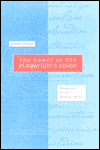
|  Playboys and Killjoys by Harry Levin Playboys and Killjoys by Harry Levin
Amazon: "Harry Levin--one of America's major literary critics--offers a brilliant and original study of the whole world of comedy, concentrating on playwrights through the centuries, from Aristophanes and Plautus in classical times to Bernard Shaw and Bertolt Brecht and their recent successors. Viewing the comic repertory as a richly varied yet broadly unified whole, Levin provides a synthesis of theories and practice. Isolating two fundamental aspects of comedy--the ludicrous and irreverent "playboy," whom we laugh with, and the ridiculous and forbidding "killjoy," whom we laugh at--he traces these components throughout history and across various cultures and media." 
| 
|
The following are some "handbooks" for people wanting to work in theatre. (n.b. Their utility is wildy subjective and unavoidably personal...)  How to's How to's
 A Sense of Direction: Some Observations on the Art of Directing by William Ball A Sense of Direction: Some Observations on the Art of Directing by William Ball
A tremendous book on directing, rehearsal, and the art of the theatre by the man who ran ACT so magnificently for so many years. Very loving and packed with warmth and insight. Possibly the most effective, educational and practical document about directing. It's a kind of checklist of decisions that must be made by the director, from the most profound philosophical ones to the nuts and bolts of costume design. Mr. Ball's voice here is the one that any director would want to provide his actors in rehearsal: calm, clear, thoroughly informed, and obviously in command. I quote it constantly. 
| 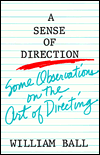 |  Backwards & Forward: A Technical Manual for Reading Plays by David Ball Backwards & Forward: A Technical Manual for Reading Plays by David Ball
A deceptively simple analysis of the art of dramatic structure that dissects a play from finish to start. By having a person read a play backwards, Ball shows how to grasp the playwright's intentions, and the character's movements. It's a basic theatrical literary theatre that is surprisingly effective, especially in trying to teach young writers how to create a play. A terse, invaluable read for anyone who works in theatre or film who wants to get a firmer grip on dramatic engineering. 
| 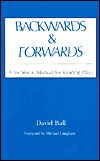
|  The Elements of Playwriting by Louis Catron The Elements of Playwriting by Louis Catron
Good basic intro by Louis Catron. He has a very solid nuts&bolts sense of craft that's terrific for newer playwrights and a solid handle on the challenges of matching a well-built play with a producing venue. Booknews: "How to write stageworthy plays, develop your theater sense, create theatrical characters, shape plot and dialogue, and find the resources to get your play produced (and that's just the subtitle). Includes advice on working with actors and script layout, excerpts from plays, and the ideas of some of the greats." Also of interest is his Playwriting: Writing Producing and Selling Your Play. of which the Playwright's Companion said "It makes for compelling reading and, once begun, is difficult to put aside. Paradoxically, Catron's is also a book which the reader will also, we believe, quickly but temporarily set aside in order to capture immediately on paper some new idea or rediscovered technique inspired by Catron's amiable and often eloquent prose. In our opinion, this is a book that avoids the pitfalls and embraces the triumphs of every other work currently available on the subject of playwriting and should be held as essential reading in the eyes of dramatists of all levels of their careers." 
| 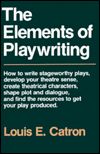
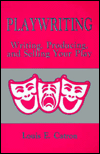
|  Shakespeare's Game by William Gibson Shakespeare's Game by William Gibson
Excellent book by the author of The Miracle Worker. Gibson isn't afraid to get into The Bard's nitty-gritty. I recommend reading it with a Collected Works of Shakespeare close at hand. As a map of the texts, Gibson's book provides astute examination and concrete examples that pack a wallop... Very much worth tracking down. Amazon: "This is the best plot-writing book I have discovered. Although the topic is play-writing, the lessons apply to fiction-plotting as well. Gibson dissects parts of 8 or 10 Shakespeare plays, showing in detail how the Bard achieved some of his most striking dramatic effects. This is far and away the best for building a coherent plot." 
| 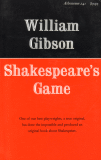
|  The Crafty Art of Playmaking by Alan Ayckbourn The Crafty Art of Playmaking by Alan Ayckbourn
Loved this MUCH more than I had expected. Half of the book covers writing, and half directing. Lots of juicy anecdotal problem solving advice. Library Journal: "Ayckbourn has been an extremely prolific and popular playwright (he has had more than 60 plays produced), and in this slim volume he shares several decades of learned wisdom and acquired expertise. For the most part his insights are amusing, thought-provoking, and helpful in turn. To illustrate his points, he draws on examples from his own plays, giving one a quick introduction to Ayckbourn as well as to playwriting. Of particular interest are his thoughts on directing, somewhat ironic as rule No. 43 is "Beware of the writer-director." Since most playwrights don't have the opportunity to direct their own work, Ayckbourn is unusual, and his experiences are well worth the price of the book. The overall tone is breezy, lighthearted, and fun. Since there are as many theories of good playwriting as writers, it's a pleasure to read one that at least brings a smile to one's face." 
| 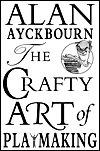
|  Playwrights on Playwriting edited by Toby Cole Playwrights on Playwriting edited by Toby Cole
Dramatists from the past 200 years, among them Chekhov, Shaw, O'Neill, and Miller, speak on their dramatic credos and on their specific plays. A superb collection of essays by the recognized masters across the spectrum of Western drama: Ibsen, Chekhov, Shaw, Synge, Pirandello, O'Neill, Williams, Duerrenmatt, etc. It is worth buying only for Thornton Wilder's brief chapter alone. 
| 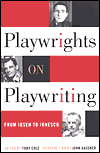
|  Solving Your Script by Jeffrey Sweet. Solving Your Script by Jeffrey Sweet.
A savvy, practical little book with lots of hands on exercises and observations about the process of "getting the thing down on paper." Several useful new ideas in here , rather than the retread of Playwrighting 101 into which so many of these books dissolve. A self-described "hardheaded approach to solving technical problems in scripts." Amazon: "Solving Your Script is a wonder, taking those ideas and going into them in depth. Sweet presents, for each topic, some discussion, an example from his own scripts, an exercise, and then several annotated responses to the exercises. Often, Sweet will teach as much in the notes for each exercise as in the rest of the book. Each lesson is an invaluable aid in the method of creating not a play - Sweet does very little by way of play discussion - but a scene. The book looks at ways to generate and bring out conflicts between and within characters, how to actually craft scenes that will captivate your audience. A fresh and useful approach." From the Author: "This book came about because a number of the readers of The Dramatist's Toolkit asked me if I had exercises I assigned when teaching. These exercises form the spine of the book, but writing this also gave me the opportunity to explore new ideas I've stumbled on in the years since the publication of The Dramatist's Toolkit. This isn't a book of vague inspiration but one intended to make writers aware of the technical options that face them when trying to tell a story with actors." | 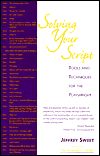
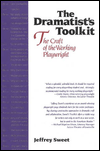
|  Papers on Playmaking edited by Brander Mattews Papers on Playmaking edited by Brander Mattews
A compendium of excerpts and essays packed with chunky how-to ruminations from such greats as Dumas fils and W.S. Gilbert... Focuses especially on 18th & 19th century stars, but packed with historical dramaturgy. 
| 
|  The Dramatic Experience: A Guide to the Reading of Plays by J. L. Styan The Dramatic Experience: A Guide to the Reading of Plays by J. L. Styan
Fantastic introduction to the art of reading plays on the page that includes superior short guides to the conventions and themes of various major periods in dramatic history as well as a discussion of structure and its impact on the theatrical experience... making it equally useful for the casual reader of plays or the student of theatre. Manages to cover a LOT in a very short space (152 pp), comprehensive without ever being patronizing. 
| 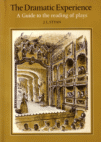
|  Composing Drama for the Stage and Screen by Stanley Longman Composing Drama for the Stage and Screen by Stanley Longman
Fairly dry, but strangely readable collegiate textbook that nonetheless features a few really terrific ideas. Tries to hit all the bases, and does for the most part, if not in the most elegant or articulate manner. 
| 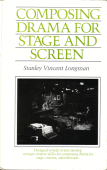
| | | |
 Biographies and Histories Biographies and Histories
 Act One by Moss Hart Act One by Moss Hart
The unforgettable, superbly written saga of how Moss Hart's first Broadway play got written, from Kaufman entering his life to the tumultuous opening night....packed with backstage history and production anecdote. "A revealing book about the theatre... It is, of course, a success story, for Moss Hart today is one of the most brilliant, successful and famous figures in the American theatre, both as a playwright and as a director." How did it happen? Not easily. His boyhood and adolescent years were spent in two entirely different backgrounds, and the stories of both are fascinating. With the opening of his first Broadway play, Once in a Lifetime, his world changed abruptly. This book concludes with a detailed telling of the complicated steps whereby that play came into being." 
| 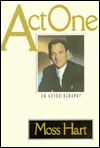
|  The Boys from Syracuse by Foster Hirsch The Boys from Syracuse by Foster Hirsch
Complete page-turner for theatrical history buffs... REALLY gives you a handle on the development of the commercial theatre and one can easily trace the roots of its current sorry state. "Despite poor beginnings and near illiteracy, Sam Shubert (1875-1905) and his brothers Lee (1873?-1953) and J.J. (1878?-1963) created a theater monopoly unrivaled in history. Ruthless and rapacious, they attracted the most sought-after stars of the day, including Al Jolson, Carmen Miranda, Eddie Cantor, Fanny Brice, Mae West, and Fred Astaire. Today their many theaters, including the Majestic, the Booth, and the Shubert, are Broadway landmarks. Alternately feared and loathed for their totalitarian business tactics, the surviving brothers, Lee and J. J., remained outsiders to their success. Reclusive in their habits and ambivalent about their marriages, they refused to speak to each other as they ran their empire from separate buildings. The Boys from Syracuse captures brilliantly and evocatively the Shuberts' unparalleled accomplishments in American show business, and the complex, often bizarre, lives of the men behind the curtain." 
| 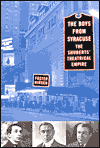
|  David Merrick: The Abominable Showman by Howard Kissel David Merrick: The Abominable Showman by Howard Kissel
Another blistering glimpse into the history of Broadway... There has never been and will never be another like David Merrick. Publisher's Weekly: "The chief theater critic for the New York Daily News has written a frank portrait of Broadway's most famous producer, a man as renowned for his outrageous behavior and sharp business practices as for the string of hits that began in 1954 with Fanny , continued through the '60s and '70s with Gypsy , Hello, Dolly! and prestigious British imports like Marat/Sade and climaxed in 1980 with the lavish stage version of 42nd Street , which ran for nine years. His story is also a social history in miniature of the changing American theater, showing the decline of the middle-class, middlebrow audience that supported Merrick's productions and the rise of nonprofit theaters in which, as one playwright remarks, "No one can make a living except the administrators.'' No theater buff will want to miss this strong--and by no means entirely unsympathetic--biography." 
| 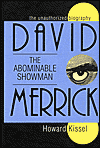
|  The Making of No, No Nanette by Don Dunn The Making of No, No Nanette by Don Dunn
Hilarious, wrenching, brutal biography of the little show that couldn't and then did. Fantastic double-crossing, gloves-off producing stories and a reminder that nothing ever changes in commercial theatre. 
| 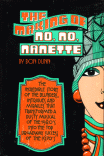
|  In Various Directions or On Acting by Tyrone Guthrie In Various Directions or On Acting by Tyrone Guthrie
HE SAW IT COMING! He predicted the devastating effect of television on the global imagination and predicted it 50 years ago... Read either of these bookfs for sharp ruminations about the history and future of theatre by one of the giants of the last century. Too few people remember why he was so important... What he did for Shakespeare production in the last century alone should get him canonized. Witty and erudite without ever talking down to his readers. A born educator whose passion for theatre was unparalleled. 
| 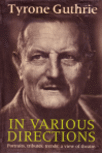 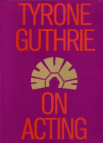
|
 The Business of Theatre... The Business of Theatre...
 From Option to Opening: A Guide to Producing Plays off-Broadway by Daniel Farber From Option to Opening: A Guide to Producing Plays off-Broadway by Daniel Farber
A MUST READ for anyone seriously pursuing a career in the professional theatre. Info-packed and strangely entertaining. “A PRACTICAL GUIDE telling would-be producers exactly how to proceed... For the neophyte in the industry, it's a must! And, since it covers so much ground... a valuable aid even for the more experienced producer.” -- Backstage "A VOLUME OF DISTINCT QUALITY... presented with admirable clarity (which indicates brevity). Under 10 headings, Farber deals with problems of options, coproducing agreements, money-raising, obtaining theatre, cast, crew and personnel, special aspects of musicals, rehearsals, openings, the run, closings, repertory, children's theatre, Off-Off-Broadway and a vivid section of 'odds and ends.’” -- Variety Donald C. Farber is widely recognized as one of the foremost theatre lawyers in the United States. He represents many theatrical productions, actors, actresses, directors, producers, authors, theatre owners, repertory companies, and persons in every aspect of theatre, film and the other creative arts in the United States, Canada and other parts of the world. 
| 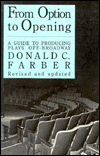
|  The Season by William Goldman The Season by William Goldman
Biting and spot-on. A snapshot of a single moment in the NY theatre that in a strange way reveals everything about the NY Theatre. Even if some of the callous, pre-PC musings are cringeworthy, it packs a wallop. Crazy and compelling. Reads like a novel, almost. Amazon: "An extraordinary book. It is written by an author with a first class mind and genuine curiosity about his subject. Whilst one may not agree with all of it, the writing is a delight and he does not shirk dealing with controversial issues such as the influence of homosexuality on the stage and the corrupt financial practices in relation to theatre tickets, etc. Even though it was written for the 1967-1968 season, it still resonates and viewed in retrospect, it provides crucial evidence relative to the etiology of the culture wars." 
| 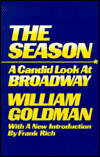
|  Producing Theatre: A Comprehensive Legal and Business Guide by Daniel Farber Producing Theatre: A Comprehensive Legal and Business Guide by Daniel Farber
The massive textbook of theatrical production that expands on Farber's Off-Bway-centric From Option to Opening above. "This standard reference work by one of the country's leading theatrical attorneys has here been brought up to date to cover all the important changes over the past five years in the legal and business aspects of producing theatre. Farber provides information and guidance on all the new laws relating to theatrical investment and liability and on recent changes in basic contracts with the various theatrical unions. Whether the production is on Broadway, off-Broadway, off-off-Broadway, in stock or repertory, and whether you a theatrical entrepreneur, an investor, an attorney, or a student, you will find here virtually everything you need to know about raising money, obtaining rights, and bringing a play to the stage. Especially useful are the appendices, which include actual examples of today's commonly used legal forms and contracts." “Simultaneously a handbook and an encyclopedia... likely to remain for some time to come the authoritative reference in its field.” - Variety "An eminently readable, authoritative, and well-organized reference work . . . Theatre owners and managers and other members of the theatrical profession will appreciate the concise treatment it brings to the intricacies of the field. Indeed, for the first time, some may understand the contracts they have signed so casually for many years." - In Print “An essential purchase... an excellent guide to the legalities involved in producing for the theatre." - Library Journal 
| 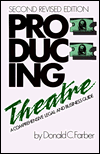
|
 ...For a list of all the ways technology has failed to improve the quality of life, please press 3... |
| If you have made mistakes, even serious ones, there is always another chance for you. What we call failure is not the falling down, but the staying down. Mary Pickford 
A mastery of detail is the key to success Hieronymous Bosch |
 Pronouncing NACOL Pronouncing NACOL
My last name is pronounced NAY-call. As in: Neigh is the call of a horse. Nacol is an Ellis island rendering of the original Lebanese name: Na'oul. Go figure. In Arabic, the name means "The Just or Fair One" according to my mother... and that's saying something. 
 Lebanese?!? Lebanese?!?
Yep. Weird huh? People expect me to be Scot-Irish, but actually my last name is Arabic, and the side of my family that I grew up with was the Lebanese. I'm a towel-head in mufti... Watch out.
|
The secret of success is to offend the greatest number of people. George Bernard Shaw 
Older, more generous We give each other hope The gift is ominous Enough praise, enough rope N. Scott Momaday The Gourd Dancer |

Education's purpose is to replace an empty mind with an open one. Malcolm S. Forbes |
We are all full of weakness and errors. Let us mutually pardon each other our follies. It is the first law of nature. Voltaire 
We are the music-makers and we are the dreamers of dreams... O'Shaughnessy |
The ultimate result of shielding men from the effects of folly is to fill the world with fools. Herbert Spencer 
When we remember we are all mad, the mysteries disappear and life stands explained. Mark Twain |
The arts are the rainforests of society. They produce the oxygen of freedom, and they are the early warning system when freedom is in danger. June Wayne 
Many people never grow up. They stay all their lives with a passionate need for external authority and guidance, pretending not to trust their own judgment. Alan Watts |
Robert Fulton was preparing to make his run of the Clermont on the Hudson river in 1807. As he started the steam engine, a bystander was heard to say, “It’ll never run, it’ll never run.”
The steam engine started. The paddle-wheels began to turn. The Clermont began to move down the Hudson.
The bystander was heard to remark, “It’ll never stop, it’ll never stop... ” So in the darkness shall be the light, and in the stillness the dancing. T.S. Eliot |
|
|






























































